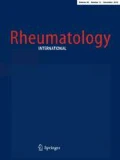Dear Editor,
Since the first novel coronavirus disease 2019 (COVID-19) patient was diagnosed in the Republic of Korea on January 20, 2020, 10,780 patients have been diagnosed as of May 2, 2020. In the middle of the COVID-19 pandemic, it is important to protect patients against infection and inaccurate information [1,2,3,4]. Adherence to strict personal hygiene rules and proper treatment are important for respiratory virus protection in patients with rheumatic diseases. A task force of the Korean College of Rheumatology (KCR) examined 15 items to help their patients using a theoretical framework. Self-care against COVID-19 for Koreans with rheumatic diseases includes conduct during infectious disease outbreaks, washing hands, precautions against airborne particles or droplets, universal facial mask use, avoiding people with a fever or symptoms and public places, being physically active inside, sun exposure, a regular diet, mental health, no smoking, treatment adherence, and caution regarding health supplement advertising. The validity of the items was evaluated in a survey conducted on the Google web service. Opinions were collected from 18 experts on the KCR committee. Ultimately, 14 items were developed with over 90% agreement and officially endorsed by the KCR April 23, 2020. They were announced by both the Korean Academy of Internal Medicine under the title “A Wise COVID-19 Life” and the KCR.
Table 1 lists the final 14 items and their agreement rates. Eleven focus exclusively on general dress guidelines, hygiene, and physical and mental activity. The recommendation concerning indoor exercise will preserve joint function and prevent muscle weakness that might result from a long stay indoors due to social distancing because of COVID-19. The recommendation regarding sunbathing in a well-lit indoor space will help produce vitamin D, which is necessary to maintain immunity and body function [3, 5]. However, patients with lupus are advised to consult a rheumatologist, as sunlight can make their disease worse. Although the long-term effects of the pandemic on rheumatic diseases are not known, stress can adversely affect the management and quality of life of patients with rheumatic diseases [6, 7]. With a prolonged indoor life, it is necessary to reduce fear, illness, social isolation, and depression as much as possible. Smoking not only exacerbates rheumatic diseases but is also a risk factor for respiratory disease, so no smoking is especially important in the COVID-19 crisis [8,9,10]. Patients with rheumatic diseases use a variety of immunomodulators and anti-inflammatory drugs administered under the supervision of a rheumatologist. A sudden discontinuation or change of dosage without consulting a rheumatologist can lead to a deterioration in condition and disease exacerbation [3, 4]. In East Asia, including Korea, many health supplements are promoted as being good for nonspecific immune function. The effectiveness of most commercial products at preventing and treating rheumatic diseases or infectious diseases, such as COVID-19, has not been sufficiently proven. Therefore, the KCR does not recommend taking health supplements for COVID-19 in patients with rheumatic diseases.
We do not know how the COVID-19 pandemic will affect people with systemic autoimmune rheumatic diseases in the long term. However, rigorous patient self-care guidelines based on hygiene and expert recommendations are the minimum for caring for those with rheumatic diseases in this crisis.
References
Zhang S, Diao MY, Duan L, Lin Z, Chen D (2020) The novel coronavirus (SARS-CoV-2) infections in China: prevention, control and challenges. Intensive Care Med 46(4):591–593. https://doi.org/10.1007/s00134-020-05977-9
Xu C, Jin J, Song J, Yang Y, Yao M, Zhang Y, Zao R, Chen Z (2020) Application of refined management in the prevention and control of coronavirus disease 2019 epidemic in non-isolated areas of a general hospital. Int J Nurs Sci. https://doi.org/10.1016/j.ijnss.2020.04.003
Misra DP, Agarwal V, Gasparyan AY, Zimba O (2020) Rheumatologists' perspective on coronavirus disease 19 (COVID-19) and potential therapeutic targets. Clin Rheumatol. https://doi.org/10.1007/s10067-020-05073-9
Pope JE (2020) What does the COVID-19 pandemic mean for rheumatology patients? Curr Treatm Opt Rheumatol. https://doi.org/10.1007/s40674-020-00145-y
McCartney DM, Byrne DG (2020) Optimisation of vitamin D status for enhanced immuno-protection against Covid-19. Ir Med J 113(4):58
Kim SY, Chanyang M, Oh DJ, Choi HG (2019) Association between depression and rheumatoid arthritis: two longitudinal follow-up studies using a national sample cohort. Rheumatology (Oxford, England). https://doi.org/10.1093/rheumatology/kez559
Altena E, Baglioni C, Espie CA, Ellis J, Gavriloff D, Holzinger B, Schlarb A, Frase L, Jernelov S, Riemann D (2020) Dealing with sleep problems during home confinement due to the COVID-19 outbreak: practical recommendations from a task force of the European CBT-I Academy. J Sleep Res. https://doi.org/10.1111/jsr.13052
Berlin I, Thomas D, Le Faou AL, Cornuz J (2020) COVID-19 and smoking. Nicotine Tob Res. https://doi.org/10.1093/ntr/ntaa059
Cai H (2020) Sex difference and smoking predisposition in patients with COVID-19. Lancet Respir Med 8(4):e20. https://doi.org/10.1016/s2213-2600(20)30117-x
Brake SJ, Barnsley K, Lu W, McAlinden KD, Eapen MS, Sohal SS (2020) Smoking upregulates angiotensin-converting enzyme-2 receptor: a potential adhesion site for novel coronavirus SARS-CoV-2 (Covid-19). J Clin Med. https://doi.org/10.3390/jcm9030841
Author information
Authors and Affiliations
Contributions
HS, HJ: data collection, writing and original draft. MS, HJ, YK: data collection, methodology. JS, SC: review and editing. SH, HS: supervision, writing, review and editing. All authors approved the final manuscript as submitted and agree to be accountable for all aspects of the work.
Corresponding author
Ethics declarations
Conflict of interest
No potential conflict of interest relevant to this article was reported.
Additional information
Publisher's Note
Springer Nature remains neutral with regard to jurisdictional claims in published maps and institutional affiliations.
The English in this document has been checked by at least two professional editors, both native speakers of English. For a certificate, please see: https://www.textcheck.com/certificate/iSzlDh.
Rights and permissions
About this article
Cite this article
Kim, HS., Lee, MS., Kim, H. et al. Self-care recommendations for patients with rheumatic diseases during the COVID-19 pandemic. Rheumatol Int 40, 1347–1349 (2020). https://doi.org/10.1007/s00296-020-04614-4
Received:
Accepted:
Published:
Issue Date:
DOI: https://doi.org/10.1007/s00296-020-04614-4

